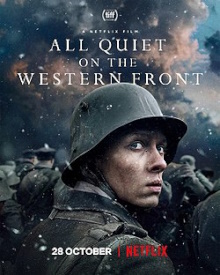We watched the original classic quite some time ago and loved it. Since an updated version couldn’t possibly top it, my first instinct was to just skip it. But this did end up winning multiple Oscars and it is easily available on Netflix so I thought I should watch it to be part of the conversation. Unfortunately my instinct turned out to be correct as this veers too close to being an action movie to be treated seriously as a critique of the war and the changes director Edward Berger made leads me to question if he even understands the point of the original. This one is a cromulent war epic I suppose but it falls far short of the 1930 version.
Along with his friends, Paul Bäumer enthusiastically enlists in the German army in 1917, faking his parents’ signature to do so. They are soon deployed to the front in France and taken in hand by an older soldier Stanislaus “Kat” Katczinsky. On the very first night, one of them is killed by artillery fire and they are soon disillusioned of any thoughts the war being romantic and easy to win. Over the next several months, Bäumer becomes a veteran soldier himself. He and his friends become thoroughly sick of the war and find solace in all kinds of antics, such as when he and Kat steal a goose from French farmers, or when one of them goes off to have a liaison with French girls. One by one his friends are killed in various incidents. Meanwhile German State Secretary Matthias Erzberger attempts to persuade the military high command to agree to armistice talks with the allies. He is horrified by the mounting cost of the war in human lives yet the the professional soldiers regard him and his party as cowards.
The most obvious departure from the first film and apparently the novel they’re all based on is the separate storyline detailing Erzberger’s efforts to seek peace. The intent is obvious: to show how the civil and military elite continue to expect and enjoy a high quality of life while the soldiers in the trenches suffer and starve. What is left out are the scenes of Bäumer returning home on leave, allowing him to observe how the civilians think and feel about the war and his alienation from them. I don’t think I should have to point out how much more valuable the latter is than the former and why it’s more immersive to stay within Bäumer’s point of view. The entire point of the story as one soldier’s ground-level perspective of the First World War is that he often has no idea what is going on outside of his immediate surroundings and the orders that come down from above are inscrutable and incomprehensible. The overall effect is that this is a much simpler and forgiving film. In this telling, the soldiers are victims and blame should be laid only on the bloodthirsty generals. It leaves out any sense that German society as a whole is, in some sense, guilty for being in favor of the war.
By now, every director who wants to make an anti-war film should know to avoid including any scenes that glorify combat or war. Berger must have missed the memo because his depiction of battles scenes plays out like an action movie. Sure, he may mean the appearance of the Saint-Chamond tanks and flamethrowers on the battlefield to be terrifying to Bäumer, but that also shows that they are awesome and powerful. It suggests not that all war and violence are terrible but that Germany losing the war because it lacks such weapons of their own is terrible. Even worse, it shows Bäumer and his friends being valiant even in the face of such powerful weapons. A better approach would be to show as little outright combat as possible, obscuring everything in smoke and Bäumer’s own panic. None of the soldiers should ever be shown as being heroic and virtuous. Another important difference between the older film and this one is that here Kat is immediately friendly and welcoming to the new recruits. In the older film, he forces them to pay him in exchange for a meal. This emphasizes how much this film wants Bäumer and his friends to be seen as heroes.
The most charitable explanation for how much worse this version is that Berger didn’t want to make an exact copy of the original classic. Even so, he might have captured the intent of the original with new scenes of his own. Instead, on every measure, he has opted for a shallower interpretation that greatly diminishes the power of the original message. In Germany itself, some critics have called this Oscar-bait, dumbing things down deliberately to appeal to the American Academy members. I’m inclined to agree and see no reason why anyone should watch this.
